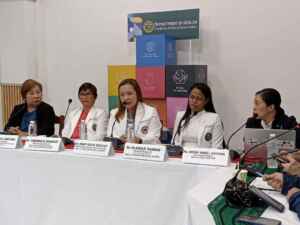ONE HAND ON THE PLOUGH, ONE HAND ON THE TRIGGER
The National Task Force to End Local Communist Armed Conflict extends its sympathies to the family and loved ones of Luis “Ka Louie” Jalandoni in this time of loss. However stark our differences, we recognize the human grief that follows any passing. Even as we hold firm to truth and accountability, we acknowledge this deep loss for those who shared their lives with Jalandoni. History, when soberly written, must be honest. And honesty demands that we confront the truth that Jalandoni helped shape the global narrative that was anti-government, anti-peace, and unapologetically pro-armed insurgency. Jalandoni was a man of many titles—former chief negotiator of the National Democratic Front, ex-priest turned communist, figurehead of a fading rebellion.
But hero of the Filipino people and champion of peace? That would be a gross mischaracterization. Lest the sycophants forget, peace talks under Jalandoni’s leadership were not peace-building efforts but political maneuvers to legitimize and shield the CPP-NPA-NDF while continuing to recruit minors, stunt the development of local communities, and attack state forces. As revealed by former rebels, these centralized peace talks were tactical gambits to popularize the CPP’s pipedream economic and political agenda dressed up as “socio-economic reforms,” serve as a ticket-to-freedom racket for their jailed leaders, and provide legroom for the NPA’s consolidation and expansion campaign. Jalandoni was driven mad by a myopic belief that peace in the Philippines could only be achieved through “the barrel of a gun,” even if it meant sacrificing generations of youth and bleeding rural communities dry.
With one hand on the plough of negotiation and the other on the trigger of ideology, Jalandoni served not as a bridge to peace but as an apologist for protracted war. Contrary to myth, Jalandoni and the rest of the Utrecht clique, had no iota of, much less operational sway, over CPP-NPA-NDF forces on the ground, defeating the premise that they can effectively represent anyone in any negotiation. The reverence afforded him by cadres was frozen in time, a symbolic role in internationalizing the insurgency and romanticizing its claims of legitimacy. The myth of “belligerency” he tirelessly propped up had always been a fantasy, disconnected from reality, and utterly detached from the suffering it justified.
It would be juvenile to call Jalandoni’s abandonment of his landed-class origins “preferential treatment for the poor.” That well-worn refrain, often recited by communists afflicted with god-complex, conveniently deflects the sobering truth that Jalandoni left the bitter reality of the domestic armed insurgency for the comforts of foreign asylum. His presence in Utrecht offered him safety, even luxury, while radicalized Filipino youths died in forests, in clashes, in lonely mountain outposts. Whatever sacrifice he made was not equal to what was asked of others. Jalandoni’s death follows those of Fidel Agcaoili and Jose Maria Sison, marking the end of an era for the Philippine communist movement’s old guard.
Yet we must be clear-eyed: Jalandoni may have departed this life, but the deceptive networks he helped build persist. The Filipino people must remain vigilant against those who continue to hide behind the cloak of activism while recruiting for the CPP-NPA-NDF, exploiting the deceptive legacy Jalandoni left behind. Instead of honoring Jalandoni’s legacy, the task force stands in solidarity with the victims—the children turned into soldiers, the youth groomed into a violent ideology, the women sexually abused and assaulted, and the families shattered by a revolution that promised liberation but delivered only suffering. While a few others romanticize the man, the NTF-ELCAC chooses to remember those who paid the real price.
Community Billboard
BCBC TREE PLANTING
July 5, 2025
HEALTHIER BENGUET
July 5, 2025
NO PEACE WITHOUT TRUTH
July 5, 2025
BENGUET NUTRI BOOTH
July 5, 2025
BENGUET NEW OFFICIALS
July 5, 2025





